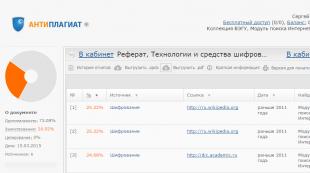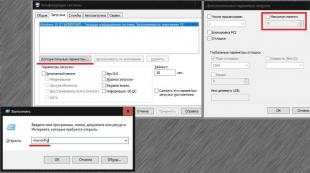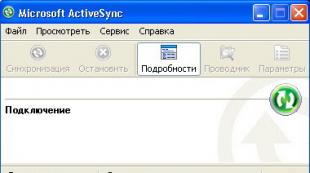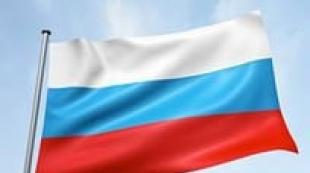Definition of the stock market. What is the stock market? The main mistakes of novice investors
is a set of rules and mechanisms that allow you to conduct transactions for the purchase and sale of securities (shares), and today it is one of the most attractive investment instruments. Since both private investors and speculators have gained access to work on stock exchanges, this type of activity is actively developing and offers a good opportunity to invest money.
If we talk about the age and applicability of technical and fundamental analysis, then the stock market is perhaps in the first place. Many books and scientific papers have been written on the topic of stock exchanges and their components. What is the stock market, or what is it also called the securities market?
Stock market - translated from English, means the stock market or the securities market, that is, this is the place where the purchase and sale of shares takes place.
Currently, there are two types of securities markets:
- Primary;
Secondary;
Primary securities market- this is a market in which the trading takes place in shares that were not yet in circulation, and their issue was carried out for the first time. As a rule, this happens when a young company, or already working on the stock exchange, but not having its own shares, requires additional financial investments from investors. This mechanism helps to attract investments to its side, and to obtain additional funds either for development or for maintaining production. The primary view is an indicator of the accumulation of investments in the country. State institutions can also act as issuers.
Secondary securities market- this is a market in which the bulk of them are not investors, but speculators, whose goal is the desire to successfully buy and resell shares (securities) for maximum profit. Work in this market is carried out with shares of companies that have been in circulation for a long time. In pursuit of the goal of earning, profits are made due to the exchange rate difference. The secondary type is a mechanism that regulates the redistribution of capital, ensuring the "overflow" of capital from one participant to another. Another important function that the secondary securities market performs is the formation of the true value of a share. It is a kind of "barometer" of the price of a particular company's stock, which reacts to changes in the situation faster than the primary view.
A developed and open stock market in the country characterizes a strong and stable economy, and helps to attract investors from other countries.
Why is the stock market so attractive today? Why is investing in securities so widespread?
For a very long time, the stock market was inaccessible to the average man in the street, so many incomprehensible and unimaginable stories arose around stock trading. In reality, work in the stock market is reduced to buying and selling shares of different companies and getting profit. The rule "buy cheaper and sell more expensive" is, perhaps, an accurate description of the essence of work on exchanges. Subsequently, when almost everyone got access to trading on world stock markets, for some it became one of the important items of income and earnings. Today, the impressive financial turnover that passes through the world stock exchanges is more than one trillion dollars. Such volumes are capable of influencing not only the capital that is present at trading and the price of individual stock instruments, but also have a strong impact on the economies of different countries.
In a period of financial instability, the stock market also plays an important role. Investing in the securities of companies that are more resilient to shocks is used as insurance against possible risks and losses.
Stock market (or stocks and bods market) Is a set of economic relations regarding the issue and circulation of securities between market participants. This is an important component of the financial sphere of activity, ensuring the accumulation and receipt of the necessary financial resources, i.e. the stock market is a segment financial market.
Strictly speaking, the stock market and the securities market are not completely overlapping concepts. The part of the securities market that is based on money capital is called the stock market. The latter forms the predominant (overwhelming) part of the securities market. Therefore, in practice, these concepts are considered synonyms.
The role of the stock market (the securities market) consists, on the one hand, in attracting funds from various sources, and, on the other, in the effective investment of funds in one of the types of the financial market.
Functions of the stock market (securities market) can be divided into two groups: general market (inherent in any market) and specific (distinguishing it from other markets). TO general market functions relate:
Receiving a profit;
formation of prices;
collection and systematization of information about the objects of trade and its participants;
creation of trading rules, procedure for resolving disputes between participants, etc.
Specific functions stock market (securities market) is:
transfer of savings of the population from unproductive to productive spheres;
redistribution of funds between industries and spheres of activity;
financing the state budget deficit on a non-inflationary basis;
insurance of currency and inflationary risks (hedging) through derivative securities.
By structure stock markets (securities markets) are classified according to various characteristics. Distinguish:
international and national securities markets;
national and regional securities markets;
markets for specific types of securities:
markets for government and corporate securities;
markets for primary and derivative securities (derivative financial instruments);
primary and secondary;
organized and unorganized;
exchange and over-the-counter;
cash and urgent.
Primary market – this is the purchase of securities by their first owners; secondary market represents the circulation of previously issued securities, the totality of all forms of transfer of securities from one owner to another during the entire period of their existence.
Organized market securities means the circulation of securities on the basis of firm stable rules between licensed professional participants in the stock market (securities market). Unorganized market - circulation of securities without observing uniform rules.
Exchange market represents trading in securities on stock exchanges, and over-the-counter market - trading in securities outside of stock institutions.
Cash market (CACHE or SPOT ) Is a market with immediate execution of trades within one to two business days. Derivatives market combines a variety of transactions with a maturity of more than 2 days (within 3 months).
The stock market (securities market) is characterized by a significant number of participants. The main ones are:
Issuers, which issue securities for primary circulation. According to Russian law, they are legal entities, a group of persons, government bodies. The issuer's actions are determined established rules:
the issue of securities must be targeted, aimed at a specific investor;
the time of appearance on the primary market of securities requires careful study;
the issue must show the investment, financial and economic advantages of the issuer;
the lower the economic status of the issuer, the more weighty the guarantors should be.
Banks are currently the leading corporate issuer in Russia.
Investors buy securities issued in circulation. The securities belong to them on the basis of ownership or other property ownership. Investors are grouped into:
individual;
institutional (collective);
professionals of the securities market.
Depending on the purpose of investment, investors are strategic and portfolio. Strategic investors propose to receive property and the right to manage it, control over the company. Portfolio investors rely only on income from the securities they own.
Stock intermediaries Are securities traders who provide a link between the issuer and the investor. Brokers(individuals and legal entities) act as intermediaries under the contract of commission or commission, receive, respectively, commission. Dealers buy and sell securities on their own behalf and at their own expense; their income is the difference between the purchase price and the sale price, i.e. margin.
Organizations serving the securities market include:
securities management companies, transferred by their owners, in order to ensure the necessary profit;
commercial banks, who, according to the legislation of Russia, on the basis of a general banking license, along with their main banking activities, have the right to act as professional dealers, ordinary investors in the securities market;
registrars- organizations that, under an agreement with issuers, keep a register of securities belonging to the issuer;
depositories- organizations that provide services for the storage of securities certificates, registration of ownership of securities;
bank-type clearing and settlement organizations- provide services to securities market participants, conduct settlement transactions between them, offset mutual claims between settlement participants; reconcile and correct information on transactions; guarantee the execution of concluded transactions;
investment funds- act as legal entities selling their shares and investing the funds received in the securities of other corporations, dividends on which provide them with the necessary income.
Dear visitors of the HeatherBober website, hello! I am Alexey Morozov, an expert and one of the authors. The topic of today's material is trading on the stock exchange.
There are slightly different laws in comparison with the Forex market, so you need to be careful.
So let's get started!
1. What is the stock market and how does it work?
The financial market can be roughly divided into three segments: commodity market, stock and foreign exchange (Forex).
In the commodity and foreign exchange markets, goods / raw materials and currency are sold, respectively, but on the stock market - securities... They can be stocks, bonds, checks, bills of exchange, futures and forward contracts, and options.
Below we describe in detail the main categories of securities quoted on the stock exchange, but for now we will get acquainted with the participants in the trading.
All people related to the stock market can be divided into three groups:
- Issuers- companies that issue securities (for example, Gazprom - the issuer of shares).
- Investors- people who buy securities to generate income from them.
- Traders- those who want to make money on a change in the price of a security, and not on direct income from it.
The difference between traders and investors is easy to explain with an example.
Example
If we buy a Gazprom share in order to receive annual dividends from it, we act as investors. If we bought a share at a price of 130 rubles and sold an hour later for 135 rubles, taking 5 rubles. profits - we behaved like traders.
It is very important to know the definition of “ blue chips". In the casino, the blue chip is the most expensive; on the stock exchange, this expression is called the securities of the largest and most reliable companies.
Blue chip stocks are guaranteed to pay dividends. In addition, they are very liquid, so they allow you to make good money on speculation. By the change in the price of blue chips, one can judge the general state of the market.
2. What can be bought on the stock market - an overview of the TOP-4 trading instruments
Let's briefly describe four main instruments that can be successfully traded on the stock exchange.
Tool 1. Stock
A share is a security, by purchasing which we contribute capital (equal to the value of the share) to the total capital of the company and receive the right to a part of its income. For example, if we buy half of all shares, we will take 50% of the company's income.
The part of the earnings of the company that the owner of the share takes for himself is called dividend... Typically, dividends are paid annually.
Sometimes the Board of Directors may decide not to share profits with the shareholders: they will be reinvested to generate even more income in the future.
Tool 2. Bonds
A bond is an obligation under which one party (the issuer) undertakes to issue a certain amount of money to the bearer of the bond at the appointed time.
The issuer of these securities can be individual firms or the state. In the first case, the issued securities will be called corporate, in the second - state... The former are taxed, the latter are not.
Bonds are not subject to such sharp fluctuations in price as stocks, so it is advisable to start trading with them.
Tool 3. Options
The principle of the option is as follows: we make an assumption how the price of a financial instrument (it can be anything) will change after a certain time, for example, in a day.
Then we buy the option, paying a certain amount for it, say ten dollars. The paid value is called option premium... When a day passes (or another period), the results are analyzed.
If the assumption turned out to be correct, we get the invested amount back and more profit. If not, we simply remain without the money previously paid for the option.
Tool 4. Futures
Futures is the obligation of one party to provide the other with a specific commodity in a specified quantity at an agreed price in the future.
Example
Let's say Rosneft wants to buy ten barrels of oil from Gazprom in a year. For this, futures are being issued: in a year, Gazprom will supply Rosneft with ten barrels at the price that was fixed at the time the parties signed the contract.
As the price of oil changes, futures can be traded freely on the exchange.
On a note
If in Forex you can trade both on the growth of the market and on the decline, then on the stock exchange it will be possible to make money only when the price of a financial instrument rises.
So, we have listed the main objects of trading, we move on to three ways to make money on the stock exchange.
The history of the emergence of the stock market goes back a long way. Already in the 13-14 centuries bill markets and periodical fairs were active. They act as a kind of prototype for the modern securities market. The first transactions with securities took place in the 16th century, it was then that the first exchanges began to appear in Lyon and Antwerp. The stock exchange and the stock market in the modern sense were established at the end of the 16th century, in parallel with the emergence of joint-stock companies.
An excursion into history and acquaintance with the concept of the stock market
The oldest is the stock exchange in Amsterdam, which began operating in 1611. It was she who became the first place where margin operations and forward REPO and DEPO transactions were practiced. The culmination of the development of the international stock market was the opening of the New York Stock Exchange. It was on it that the first investment mechanisms in history were first developed and implemented. It became the basis for the formation of multi-billion dollar financial empires, in particular Rockefeller.
The stock market is a regulated component that provides the ability to trade securities not only on the exchange market, but also over the counter. Consequently, the concepts of "stock market" and "securities market" are by and large synonymous. The international stock market is a set of markets of all countries that are integrated into a single whole and allow financial manipulations with securities. It can be concluded that the international stock market is nothing more than an integral part of the world capital market, which, in tandem with the money market, is, in fact, a global financial system.
Who takes part in the life of the market and what operations are carried out on it
The world stock market belongs to the category of supranational structures. It integrates the stock markets of all world states. At a time when either individuals or legal entities act as participants in domestic markets, the states themselves are represented on the international platform as participants in trade. Almost all participants in the world economy have access to the platform, and their location does not affect this fact, which automatically makes the market both global and universal.

The stock market is to some extent a tandem and transnational companies, and international stock exchanges, and brokerage houses, and dealers, and government agencies, and financial institutions. Institutions such as banks, insurance agencies, government financial services are also involved in the life of the market and can influence the movement of the market. All transactions carried out within the market can be differentiated into two categories. Commercial manipulation is a settlement between the parties for export and import operations. Financial manipulation is the flow of capital between the most diverse spheres of the economy.
Market division: primary and secondary market
The stock market for securities can be called the institution or mechanism that provides the basis for interaction between buyers who are demand-bearers and sellers who are suppliers of value. The stock market can be divided into primary and secondary. Each subtype of the institute has a clear set of tasks.

Primary market
The primary market is the market for stocks and bonds, short-term government bonds and loans, federal loans. The concept includes the market for bonds of a foreign currency loan and treasury bonds, a gold certificate with financial instruments. According to the legislation, the primary market is defined as a relationship that is formed during the issue in the aspect of investment securities or during the implementation of civil and legal transactions between persons who have assumed the entire range of obligations for securities, and investors, professional participants in the financial industry or their representatives.
The primary market can be called the market for the first or repeated issues of securities, within which their primary distribution among investors is realized. Information on securities, with prospectuses, registration and control by state bodies, inclusive, is completely open to investors, which allows them to make a rational and deliberate choice of the latter.
The primary market is presented in two formats. This is a private placement, with its inherent sale of securities to a strictly limited number of investors, determined in advance (without a public offering), and a public offering, which is carried out by publishing a public announcement (includes the sale of shares to an unlimited number of investors).
Secondary market
The secondary financial and stock market includes stock exchanges and stock divisions of commodity exchanges that are dedicated to pre-issued shares and financial instruments. The concept implies a relationship that is formed during the rotation of pre-issued securities within the primary market. The secondary market is based on transactions that support the redistribution of the spheres of influence of foreign investment, with some speculative transactions inclusive.

Securities are divided into organized (or also into unorganized or over-the-counter (street). The secondary stock market provides a stable structured restructuring of the economy in order to increase its efficiency. It is mandatory for the existence of the securities market, just like the primary. A characteristic feature of the institution is liquidity, becoming an aid for the implementation of successful trading and for the ability to absorb a large number of securities in a short time.At the same time, fluctuations in rates remain at an insignificant level, and the costs of selling are minimal.The mechanism of trading in the secondary market ensures the stability of the market itself and limits speculation.
Why is the stock market needed?
The stock market is a universal financial structure that affects many areas of activity. The Institute influences business, as it is inherently the easiest way to get finance for the development and prosperity of a young corporation. When a start-up company sells shares, a share of ownership, it receives capital in its hands that does not need to be returned and on which there is no need to pay interest, as is the case with obtaining a loan from a bank. Shares turn into money not only with great speed, but also with large dividends.
Stock prices, which are largely formed by the stock market participants themselves, have a direct impact on the state of the economy and act as an indicator of social sentiment. The economy in which the stock market is developing is considered to be developing, and the country is strong and prosperous. Trading in the stock market opens up great prospects for ordinary people. Trading participants who do not have large capital can become co-owners of shares in large world concerns and in the future receive stable profits from them.

Domestic stock market
Until recently, over the past four years, the Russian stock market showed active growth rates, which underlined its dominant role in the development of the state's economy. At the first stages of its development, the market played the role of distribution of property within the country, but today its main purpose is to attract foreign capital to the Russian economy. At the moment, the capitalization of the domestic stock market is $ 498 billion, which is 80 percent of the country's GDP.
Experts predicted that, despite the crisis, in 2015 the market capitalization will increase by 2.5-3 billion. In fact, the situation has only worsened, and the entire stock market is now cheaper than Apple stocks. Statistical analyzes clearly show that the development potential of the Russian stock market has not yet been exhausted. The prosperity of the institution is a prerequisite for ensuring a sufficiently high level of competitiveness in the battle for global investors in the international stock market. Not only individuals are interested in the development of the market, but also enterprises that want to attract investments through bonded loans.
Domestic stock market 2015
The Russian stock market has serious problems associated with problems in the legislation, with a low level of development of investor activity, with the invalidity of companies and a lack of corporate culture. At the same time, according to the estimates of world experts, the Russian stock exchange currently belongs to the category of the worst in the world, despite its good potential. This fact is evidenced by the RTS dollar index, which since the beginning of 2014 has dropped by more than 50 percent.
The situation is worse only in the market of Ukraine, Portugal and Greece. The ruble is systematically weakening against the dollar. The latest post-trade readings were recorded below 60 rubles, the largest intraday drop since 1998. The statements of the Central Bank pushed the fall in the currency, which announced the forecast for next year, based on the oil price of $ 60 per barrel, which is absolutely not true. Investors are losing interest in the Russian market, which is reflected in the state of the economy.

Stock market of america
In contrast to the situation in which the Russian stock market is today, its American counterpart is considered the most liquid in the world. The world's largest companies are run within it. These are not only shares of corporations and securities of foreign organizations, but also depositary receipts, exchange-traded funds, and many other instruments. The American Stock Exchange in New York serves as a platform for trades in second-rate securities. In the early stages of its development, the exchange was presented in the format of an open-air plaza on Wall Street, where transactions were concluded. Only since 1921 has the retail space moved to a covered space.
To be able to invest in the American stock market, you need to open an account with one of the brokers, which is focused on providing services to traders from Russia. Each broker has specialists who will tell newbies what to do and how to do it. The rating of stock market brokers indicates that it is preferable to cooperate with such companies as Finam and Capital Management, Insta Trade and United Traders, INVEST. which, according to a number of criteria, have been identified by the world's best agencies as the most reliable.
Features of trading on the American Stock Exchange
The Russian stock market is fundamentally different from the American one, which determines the specifics of trading on the latter. Let's start with the fact that transactions within the platform are concluded between bidders. Spread losses are optional. Market participants can not only accept or reject prices, they can propose their own. Within the framework of the exchange, each trader gets access to information, which includes not only the price chart. The trader can estimate the volume of transactions, the depth of the market, the ribbon of prints and imbalances.

The stock exchange offers a huge range of trading instruments, of which there are no less than 6.5 thousand, which automatically provides excellent opportunities for competent risk diversification. Trading on the stock exchange can be carried out on a daily basis, since the number of shares is very large, and it is very easy to find the optimal ratio of risks and rewards. In order to start active trading in stocks, you need a deposit of at least a thousand dollars. Companies offering to start with $ 500 offer very disadvantageous trading conditions. You have to pay for separately, but the profit from trading more than covers all costs.
The capitalization of the American market is equal to many trillions of dollars, which makes it attractive to investors from all over the world. And within the market there is a huge number of both undervalued stocks, which will allow you to make good money, and a large number of overvalued ones, which open up no less broad prospects. Experts recommend developing long-term investment projects, rather than relying on immediate profits and quick income.
Or stocks and bods market Is a part of the financial market in which securities are traded.
When a company lacks its own funds to develop its business, it can attract them from outside. To do this, the company can:
- take a bank loan is the easiest and most common way to get the missing funds;
- to issue - these are debt securities, in fact, the company borrows money from investors, then pledging to return it with interest. Bonds are issued not only by companies, but also by governments.
- to issue are equity securities. By selling shares, the company gets money, and investors get a stake in the company. The company is not obliged to return this money to investors, but investors can receive income from them in the form of dividends, growth in market value, and also participate in the management of the company.
Thus, the stock market is a place for attracting and redistributing capital between various participants, enterprises, structures and sectors of the economy. The stock market is a complex and important mechanism that ensures the functioning of the country's economy. In this regard, there is a strict system for admitting organizations to work on the stock market. To operate on the stock market, an organization must obtain a license to participate in the securities market. Previously, licenses were issued by the Federal Service for Financial Markets (FFMS), but in 2013, due to the abolition of the FFMS, these functions were transferred to the Central Bank of the Russian Federation as part of the creation of the so-called mega-regulator. The Central Bank of the Russian Federation not only issues licenses, but also exercises control over the activities of market participants. Professional participants in the securities market are brokers, dealers, trustees, depositories, registrars, management companies. All of them perform different roles and functions in the market and are licensed accordingly. Only these organizations have direct access to the securities market.
Institutional investors also work on the market - these are large organizations, which include banks, insurance companies, non-state pension funds.
Primary and secondary stock market.
When a company sells its securities for the first time, they are placed on primary market. At this stage, the company receives money for development, and investors - securities. Then the investors have the right to resell the purchased securities to other investors for secondary market... The company has no relation to these transactions between investors and does not receive anything from them. Thus, the primary sale of securities to investors takes place in the primary market, and their further circulation in the secondary market. The secondary market is no less important than the primary one. If investors did not have the opportunity to resell their securities on the secondary market, they would not be so willing to buy them on the primary.

Primary and secondary stock market
Exchange and OTC stock market.
Exchange Is an organized securities market, trading on which takes place in accordance with the established rules. Only securities of large companies that have passed a strict selection are allowed on the exchange market. Securities of small companies that cannot or do not want to be selected on the exchange are traded on over-the-counter market. Both on the exchange and on the over-the-counter market, trading is carried out using electronic systems. In Russia, exchange trading takes place on the Moscow Exchange. Securities of such well-known companies as Gazprom, Sberbank, Lukoil, MMC Norilsk Nickel, VTB, Rosneft and others are traded on it. The OTC market is represented by the RTS Board trading system. It trades securities of little-known small companies, trades are rare, since there are few securities in free circulation and it is not always possible to immediately find a seller or a buyer.
According to the type of securities traded, the markets are divided into debt market(bond and bill market), and derivatives market(futures and options).
Private investors do not have direct access to the stock market. Trading is carried out through a professional participant in the securities market - a broker.









